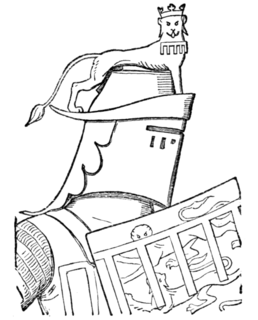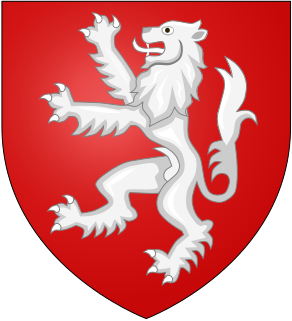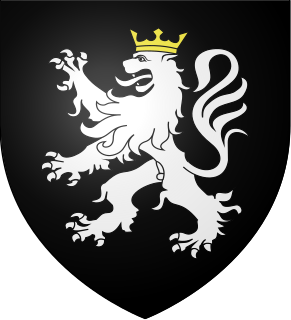Related Research Articles

William Marshal, 1st Earl of Pembroke, also called William the Marshal, was an Anglo-Norman soldier and statesman. He served five English kings—Henry II, his sons the "Young King" Henry, Richard I, John, and John's son Henry III.

The Earldom of Pembroke is a title in the Peerage of England that was first created in the 12th century by King Stephen of England. The title, which is associated with Pembroke, Pembrokeshire in West Wales, has been recreated ten times from its original inception. Due to the number of creations of the Earldom, the original seat of Pembroke Castle is no longer attached to the title.

Earl Marshal is a hereditary royal officeholder and chivalric title under the sovereign of the United Kingdom used in England. He is the eighth of the Great Officers of State in the United Kingdom, ranking beneath the Lord High Constable and above the Lord High Admiral. A Duke of Norfolk has held the office since 1672.

Thomas de Mowbray, 1st Duke of Norfolk, 1st Earl of Nottingham, 3rd Earl of Norfolk, 6th Baron Mowbray, 7th Baron Segrave, KG, Earl Marshal was an English peer. As a result of his involvement in the power struggles which led up to the fall of Richard II, he was banished and died in exile in Venice.

The Lord Warden of the Cinque Ports is a ceremonial official in the United Kingdom. The post dates from at least the 12th century, when the title was Keeper of the Coast, but may be older. The Lord Warden was originally in charge of the Cinque Ports, a group of five port towns on the southeast coast of England that was formed to collectively supply ships for The Crown in the absence at the time of a formal navy. Today the role is a sinecure and an honorary title, and fourteen towns belong to the Cinque Ports confederation. The title is one of the higher honours bestowed by the Sovereign; it has often been held by members of the Royal Family or prime ministers, especially those who have been influential in defending Britain at times of war.
Peter de Rivaux or Peter de Rivallis was an influential Poitevin courtier at the court of Henry III of England. He was related to Peter des Roches, being a nephew.

The House of Mowbray is an Anglo-Norman noble house, derived from Montbray in Normandy and founded by Roger de Mowbray, son of Nigel d'Aubigny.

Richard Marshal, 3rd Earl of Pembroke, was the son of William Marshal, 1st Earl of Pembroke and brother of William Marshal, 2nd Earl of Pembroke, whom he succeeded to the Earldom of Pembroke and Lord Marshal of England upon his brother's death on 6 April 1231.

Gilbert Marshal, 4th Earl of Pembroke was the third son of William Marshal, 1st Earl of Pembroke and Countess Isabel, the daughter of Richard son of Gilbert, earl of Striguil.
Eva Marshal (1203–1246) was a Cambro-Norman noblewoman and the wife of the powerful Marcher lord William de Braose. She was the daughter of William Marshal, 1st Earl of Pembroke, and the granddaughter of Strongbow and Aoife of Leinster.

John Segrave, 2nd Baron Segrave (1256–1325) was an English commander in the First War of Scottish Independence.

Walter Marshal, 5th Earl of Pembroke was the fourth son of William Marshal, 1st Earl of Pembroke and Countess Isabel, the daughter of Richard son of Gilbert, earl of Striguil.
Edmund de Stafford, 1st Baron Stafford (1272/3-1308), was the son of Nicholas de Stafford, who was summoned to parliament by writ on 6 February 1299 by King Edward I.
John du Plessis or Plessetis, Earl of Warwick was an Anglo-Norman nobleman in the service of King Henry III of England.
Peter de Maulay or Peter de Mauley was a nobleman and administrator who was one of King John of England's "evil counsellors". First appearing in the historical record in 1202, Maulay was in England by 1204 and serving as an official of John. During the rebellions of the end of John's reign, Maulay supported the king and was given custody of the king's younger son as well as important prisoners. Maulay continued to serve the new king after 1216 but ran into difficulties with the regents for the young King Henry III and was accused of treason in 1221. Although cleared of the treason accusation, Maulay retired to his lands in late 1221. In 1223 Maulay's lands at Upavon were confiscated by the king but were returned within a few months. Upavon was again confiscated in 1229 and given to another noble, but in 1233 King Henry regranted the manor to Maulay, an event which led to a revolt by Richard Marshal, the Earl of Pembroke, against the king. In 1241 Maulay went on crusade and died in late 1241, probably in the Holy Land while on crusade.
John Devereux of Bodenham and Decies was an Anglo-Norman nobleman living during the reigns of King John and Henry III of England. The Devereux were a prominent knightly family along the Welsh Marches during the thirteenth century, and John Devereux was a key member of the retinue of Richard Marshal, 3rd Earl of Pembroke, and companion of Walter III de Clifford, Baron of Clifford.

Nicholas Carew was a baron of medieval England who took part in the Wars of Scottish Independence.

Richard Siward was a distinguished 13th-century soldier, adventurer and banneret. He rose from obscurity to become a member of King Henry III's Royal Council and husband of Philippa Basset, the widowed countess of Warwick.

Hugh de Vivonne was a French knight from Vivonne in the County of Poitou. He was loyal to the Plantagenet family and supported their right to vast lands in France. From 1215 onward he made his home in England, where he was constable of Bristol Castle and later High Sheriff of Somerset and Dorset (1241–49). He married an English lady and became lord of Chewton and Curry Mallet. He received further English estates in compensation for the loss of his lands in France. Yet, as a foreign soldier in the king's pay, he has been described as merely a "Poitevin mercenary captain".

Philippa Basset, Countess of Warwick, was a 13th-century noblewoman and heiress. She was the wife firstly of Henry (II) de Newburgh, earl of Warwick and after his premature death she was married to Richard Siward a soldier and adventurer at the court of King Henry III of England.
References
![]() This article incorporates text from a publication now in the public domain : "Basset, Gilbert". Dictionary of National Biography . London: Smith, Elder & Co. 1885–1900.
This article incorporates text from a publication now in the public domain : "Basset, Gilbert". Dictionary of National Biography . London: Smith, Elder & Co. 1885–1900.